 W
WAbdurrahman Nurettin Pasha, also known as Nurettin Pasha (1833–1912) was an Ottoman statesman. He was the Grand Vizier of the Ottoman Empire from 2 May 1882 to 12 July 1882.
 W
WAhmed Arifi Pasha was an Ottoman noble, senator, statesman and reformist, who served as Grand Vizier of the Ottoman Empire in 1879. In contemporary English-language accounts he was known as Aarifi Pasha. He was a liberal and supported Midhat Pasha’s efforts to introduce the First Constitutional Era.
 W
WAhmed Javad Pasha, also known as Kabaaghachlyzadeh Ahmed Javad Pasha and Javad Shakir Pasha, was an Ottoman career officer and statesman. He served as Grand Vizier of the Ottoman Empire from September 4, 1891, to June 8, 1895.
 W
WAhmed Esad Pasha was an Ottoman conservative statesman. He was Grand Vizier of the Ottoman Empire during two terms in 1873 and 1875.
 W
WAhmed Hamdi Pasha (1826–1885) was an Ottoman monarchist, administrator and conservative statesman during the First Constitutional Era.
 W
WAhmed Vefik Pasha was an Ottoman statesman, diplomat, scholar, playwright, and translator during the Tanzimat and First Constitutional Era periods. He was commissioned with top-rank governmental duties, including presiding over the first Ottoman Parliament in 1877. He also served as Grand Vizier for two brief periods. Vefik also established the first Ottoman theatre and initiated the first Western style theatre plays in Bursa and translated Molière's major works. His portrait was depicted on a former Turkish postcard stamp.
 W
WBenderli Ali Pasha was an Ottoman statesman. He was Grand Vizier of the Ottoman Empire.
 W
WMehmed Emin Âli Pasha, also spelled as Mehmed Emin Aali was a prominent Ottoman statesman during the Tanzimat period, best known as the architect of the Ottoman Reform Edict of 1856, and for his role in the Treaty of Paris (1856) that ended the Crimean War. Âli Pasha was widely regarded as a deft and able statesman, and often credited with preventing an early break-up of the empire.
 W
WMehmed Fuad Pasha, sometimes known as Keçecizade Mehmed Fuad Pasha and commonly known as Fuad Pasha, was an Ottoman administrator and statesman, who is known for his prominent role in the Tanzimat reforms of the mid-19th-century Ottoman Empire, as well as his leadership during the 1860 Mount Lebanon civil war in Syria. He represented a modern Ottoman era, given his openness to European-style modernization as well as the reforms he helped to enact.
 W
WHayreddin Pasha was an Ottoman-Tunisian statesman and reformer, who was born to a Circassian family. First serving as Grand Vizier of the Beylik of Tunis, he later achieved the high post of Grand Vizier of the Ottoman Empire, serving from 4 December 1878 until 29 July 1879. He was a political reformer during a period of growing European ascendancy. He was a pragmatic activist who reacted against poor conditions in Muslim states, and looked to Europe for solutions. He applied the Islamic concept of "maṣlaḥah", to economic issues. He emphasized the central role of justice and security in economic development. He was a major advocate of "tanẓīmāt" for Tunisia's political and economic systems.
 W
WHurshid Ahmed Pasha was an Ottoman general, and Grand Vizier during the early 19th century.
 W
WHüseyin Avni Pasha was an Ottoman governor-general and statesman. He was Grand Vizier of the Ottoman Empire from 15 February 1874 to 26 April 1875. He was killed by Çerkess Hassan the younger brother of Neşerek Kadın Efendi, who accused him of the murder of Ottoman Sultan Abdülaziz, on 15 June 1876 during a cabinet meeting of Ottoman Sultan Murad V at the residence of Midhat Pasha near Beyazıt in Fatih, Istanbul. The foreign affairs minister Mehmed Rashid Pasha was also killed in the attack.
 W
WKoca Hüsrev Mehmed Pasha was an Ottoman admiral, reformer and statesman, who was Kapudan Pasha of the Ottoman Navy. He reached the position of Grand Vizier rather late in his career, between 2 July 1839 and 8 June 1840 during the reign of Abdulmejid I. However, during the 1820s, he occupied key administrative roles in the fight against regional warlords, the reformation of the army, and the reformation of Turkish attire. He was one of the main statesmen who predicted a war with the Russian Empire, which would eventually be the case with the outbreak of the Crimean War.
 W
WIbrahim Edhem Pasha (1819–1893) was an Ottoman statesman, who held the office of Grand Vizier in the beginning of Abdul Hamid II's reign between 5 February 1877 and 11 January 1878. He resigned from that post after the Ottoman chances on winning the Russo-Turkish War (1877–1878) had decreased. He furthermore served numerous administrative positions in the Ottoman Empire including minister of foreign affairs in 1856, then ambassador to Berlin in 1876, and to Vienna from 1879 to 1882. He also served as a military engineer and as Minister of Interior from 1883 to 1885. In 1876–1877, he represented the Ottoman Government at the Constantinople Conference.
 W
Wİbrahim Sarim Pasha (1801–1853) was an Ottoman statesman. He was Grand Vizier of the Ottoman Empire from 29 April 1848 until 12 August 1848.
 W
WTopal Izzet Mehmed Pasha, Topal Izzet Pasha, or Darendeli Mehmed Pasha was an Ottoman admiral and reformist statesman during the Tanzimat period of reformation. He was Grand Vizier of the Ottoman Empire during two terms:24 October 1828 - 28 January 1829 7 October 1841 - 30 August 1842
 W
WMehmed Kadri Pasha also known as Kadri Pasha was an Ottoman statesman and reformer. He was the Grand Vizier of the Ottoman Empire during the reign of Abdul Hamid II from 9 June 1880 to 12 September 1880. From 11 February 1876 to 4 February 1877, he was also the mayor (şehremini) of Constantinople.
 W
WKıbrıslı Mehmed Emin Pasha was an Ottoman civil servant and statesman of Turkish Cypriot origin, who served at the top post of Grand Vizier during three different times under the reign of the sultan Abdülmecid I.
 W
WMahmud Nedim Pasha was an Ottoman conservative statesman of ethnic Georgian background, who served as Grand Vizier of the Ottoman Empire between 1871–1872 and 1875–1876.
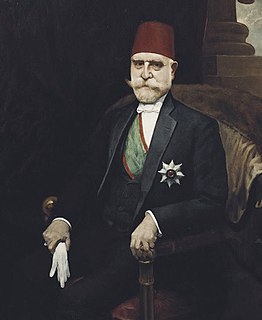 W
WDamat Mehmed Ali Pasha (1813–1868) was an Ottoman statesman and diplomat. He served as the Grand Vizier from October 3, 1852, to May 14, 1853, on the eve of the Crimean War. Along with Fuad Pasha, Mehmed Emin Âli Pasha and Mustafa Reşid Pasha, he was one of the main reformers of the Tanzimat period.
 W
WMehmed Emin Rauf Pasha (1780–1860) was an Ottoman industrialist and statesman, who was Grand Vizier of the Ottoman Empire twice under Mahmud II and three times under Abdülmecit I during the Tanzimat period of reformation.
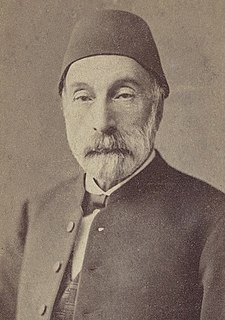 W
WMehmed Esad Saffet Pasha, also known as Saffet Pasha (1814–1883), was an Ottoman statesman, diplomat and reformer, who served as the Grand Vizier of the Ottoman Empire during the reign of Abdul Hamid II. He was a representative of the Ottoman Empire, alongside Sadullah Pasha at the Congress of Berlin.
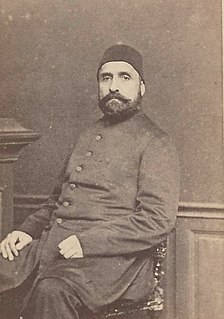 W
WMehmed Rushdi Pasha was an Ottoman reformist and statesman. He served as Grand Vizier of the Ottoman Empire during five separate terms. He was preceded by Midhat Pasha. Mehmed Rushdi Pasha was a fervent supporter of the Tanzimat. He believed that the empire would lag behind the West if no attempt was made to modernize itself. He served as a Translator of Military texts as well as a military colonel in his youth. He was born in 1811, and died on 27 March 1882.
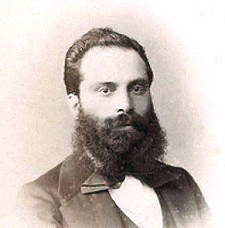 W
WMehmed Sadık Pasha was an Ottoman conservative statesman and a member of the Senate. He was Grand Vizier of the Ottoman Empire from 18 April 1878 until 28 May 1878. He also served as governor of the Aidin Vilayet of the Ottoman Empire.
 W
WMehmed Said Pasha, also known as Küçük Said Pasha or Şapur Çelebi or in his youth as Mabeyn Başkatibi Said Bey, was an Ottoman monarchist, senator, statesman and editor of the Turkish newspaper Jerid-i-Havadis. He was among the statesmen who were disliked by the CUP, the political party which came to power after the Ottoman coup d'état of 1913.
 W
WAhmed Şefik Midhat Pasha was an Ottoman democrat, kingmaker and one of the leading statesmen during the late Tanzimat period. He is most famous for leading the Ottoman constitutional movement of 1876 and introducing the First Constitutional Era, but was also a leading figure of reform in the educational and provincial administrations. He was part of a governing elite which recognized the crisis the Empire was in and considered reform to be a dire need. Midhat Pasha is described as a person with a liberal attitude and is often considered one of the founders of the Ottoman Parliament.
 W
WMustafa Naili Pasha was an Ottoman statesman, who held the office of Grand Vizier twice during the reign of Abdülmecid I, the first time between 14 May 1853 and 29 May 1854, and the second time between 6 August 1857 and 22 October 1857.
 W
WAlemdar Mustafa Pasha was an Ottoman military commander and a Grand Vizier born in Khotyn in then Ottoman territory Ukraine in 1765. He was of Tosk Albanian origin, from the village of Goskovë near Korçë. Both alemdar and bayraktar mean "the standard bearer" and were the names given to the same rank in the Janissary corps. Alemdar Mustafa Pasha is often regarded as one of the pioneering public figures, who recognized the need of a modern army, as he was instrumental in setting up the French military mission in 1796.
 W
WHalil Rifat Pasha was an Ottoman parliamentarian during the First Constitutional Era, a statesman and a Grand Vizier for six years between 1895 until his death in 1901, during the late Abdul Hamid II era.
 W
WMehmed Kâmil Pasha, also spelled as Kiamil Pasha, was an Ottoman statesman and liberal politician of Turkish Cypriot origin in the late-19th-century and early-20th-century. He was the Grand Vizier of the Empire during four different periods.
 W
WReşid Mehmed Pasha, also known as Kütahı, was a notorious Ottoman statesman and general who reached the post of Grand Vizier in the first half of the 19th century, playing an important role in the Greek War of Independence.
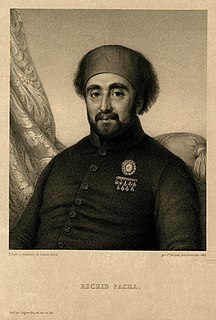 W
WKoca Mustafa Reşid Pasha was an Ottoman statesman and diplomat, known best as the chief architect behind the Ottoman government reforms known as Tanzimat.
 W
WŞirvanlı Mehmed Rüşdi Pasha (1828–1874) was an Ottoman statesman. He was Grand Vizier of the Ottoman Empire from 15 April 1873 until 15 February 1874.
 W
WYusuf Kamil Pasha was an Ottoman statesman. He was Grand Vizier of the Ottoman Empire from 5 January 1863 until 1 June 1863 during the reign of Abdulaziz.